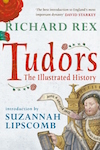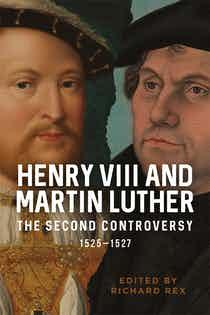Biography
Although not a frequent performer in the travelling circus of modern academia, he nevertheless makes occasional guest appearances at the Academia Moriae, Amaurote, as well as at universities and schools closer to home.
In September 2019, Professor Rex delivered the Wadsworth Lecture at the School of Religious Studies at McGill, under the title 'The Reformation in England and France: Tales of the Unexpected'.
In October he gave a lecture to the History sixth-formers at the Charter School North Dulwich on 'The Henrician and Edwardian Reformations: Continuity or Contradiction?'.
For his scintillating reflections on the history and historiography of the English Reformation, see his 2017 online article in Marginalia, 'Disenchanting the English Reformation'.
Research
Richard Rex's research interests focus on the interaction between religion, politics, and ideas in early modern England and Europe.
Publications
Professor Rex's most recent book explores the exchange of letters between Martin Luther and Henry VIII in 1525-26 and its repercussions around Europe in 1525-26:
His ground-breaking account of the emergence of the theology of Martin Luther was first published in 2017, and was reissued in paperback in 2019:

To mark this republication, he gave an interview on the book to the online review Edinburgh49.
 Richard Rex’s popular survey of the Tudors was reissued in 2014 as Tudors: the Illustrated History (Amberley).
Richard Rex’s popular survey of the Tudors was reissued in 2014 as Tudors: the Illustrated History (Amberley).
His other books include the elegant thematic survey Henry VIII and the English Reformation (2nd edn. Palgrave, 2006) and the controversial The Lollards (Palgrave, 2002).
The Lollards (Palgrave, 2002) aimed a controversial arrow at the hot air balloon of Lollard studies. It was greeted with mixed reviews, the more hostile from those flying the balloon. As David Aers trenchantly put it: “For an extended attempt to explicate the unimportance of Wycliffites (except in the addled minds of literary historians and Protestant ideologues in need of origins), see Richard Rex, The Lollards (Basingstoke: Palgrave, 2002).” See David Aers, Sanctifying Signs, (University of Notre Dame Press, 2004), p. 233, note 21.) The author has thus far seen no reason to revise the main outlines of this interpretation.
Over the years Richard Rex has translated a number of scholarly books from French, including Yves-Marie Bercé’s The Birth of Absolutism: A History of France 1598-1661 (Palgrave, 1995) and Lucien Musset’s The Bayeux Tapestry (Boydell, 2005). And in 2012 he translated Catholicism and Democracy (Princeton University Press), by Emile Perreau-Saussine (1972-2010).
For as a full a list of his publications as can easily be put together, see his profile on Google Scholar: https://scholar.google.co.uk/
Among his more recent academic articles are the following:
-
‘A Newly Discovered Poem by Erasmus’, co-authored with David Butterfield, Humanistica Lovaniensia: Journal of Neo-Latin Studies 65 (2016), pp. 165-78
-
‘Humanist Bible Controversies’, in The New Cambridge History of the Bible. Volume 3, From 1450 to 1750 , ed. Euan Cameron (Cambridge: Cambridge University Press, 2016), pp. 61-81
-
‘Councils, Counsel, and Consensus in Henry VIII’s Reformation’, in The Politics of Counsel in England and Scotland, 1286-1707, ed. Jacqueline Rose (London: British Academy, 2016), pp. 135-50
-
‘Luther among the Humanists’, in Martin Luther: a Christian between Reforms and Modernity, 1517-2017 (New York: Boston, 2017), pp. 203-220
Coming soon
- ‘Ascham & Co.: St John’s College, Cambridge, in the 1540s’, in Roger Ascham and his Sixteenth-Century World, ed. L. Nicholas & C. Law (Leiden: E. J. Brill)
Teaching and Supervisions
Professor Rex's main contribution to the Faculty's academic programme is on the MPhil Pathway in Anglican Studies:
https://www.divinity.cam.ac.uk/study-here/mphil/AnglicanStudies


